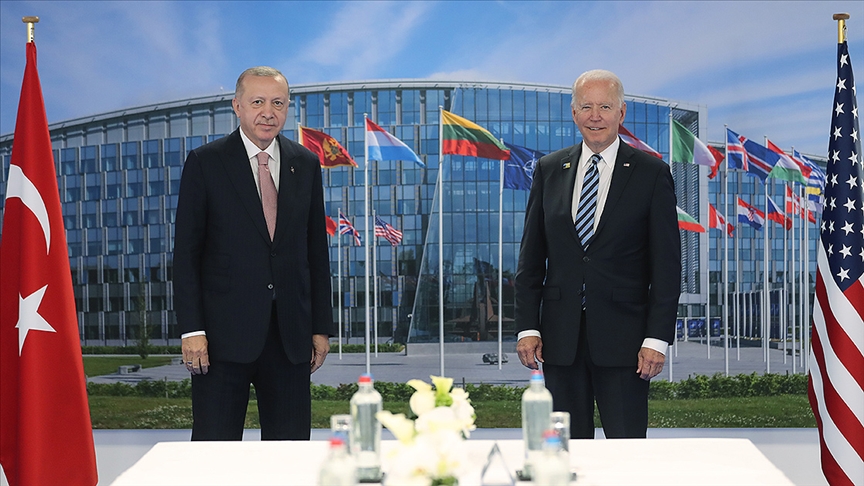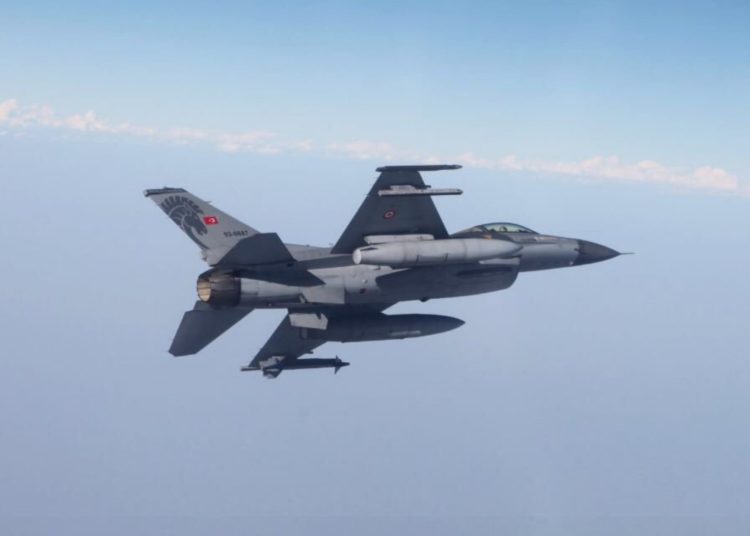Levent Kenez/Stockholm
The government of Turkish President Recep Tayyip Erdogan, aiming to enhance its defense capabilities, initially announced during the election campaign in May plans to domestically produce indigenous fighter jets and modernize its aging F-16 fleet. However, since its election victory, the focus has shifted to first purchasing F-16s, which could make it more challenging for Ankara to resist Sweden’s application for NATO membership.
On May 31 US President Joe Biden told journalists that Erdogan had raised the issue of purchasing F-16 fighter jets during his phone call to congratulate him on his re-election as president. In response, Biden mentioned Sweden’s NATO membership, he said.
According to reports from Turkey’s pro-government media on Monday, the White House expressed its support for Ankara’s purchase of F-16 fighter jets. The reports also indicate that Jake Sullivan, Biden’s national security advisor, is actively working to address the opposition to this sale. Members of Congress have urged Ankara to make significant policy changes, stating that Turkey’s objection to Sweden’s NATO membership is not the sole concern, as reported by the Turkish media.

In 2021 the US administration excluded Turkey from the F-35 Joint Strike Fighter program due to Ankara’s purchase of a Russian S-400 missile system. As a result, Turkey is now seeking to purchase 40 Lockheed Martin F-16 fighter jets and 79 modernization kits to upgrade its outdated F-16 fleet.
However, Ankara’s requests faced obstacles due to its opposition to the NATO membership applications of Finland and Sweden. In February US senators from both the Democratic and Republican parties sent a letter to Biden urging him to postpone a $20 billion F-16 sale to Turkey until Sweden and Finland’s NATO accession is approved. Finland became NATO’s newest member on April 4.
Nevertheless, the White House does not want to further isolate Ankara from the Western alliance or push it towards alternative markets like France, the UK or Russia since Turkey has not activated the S-400 missile system. If Turkey fails to acquire F-16s after being removed from the F-35 project, it would be a significant setback.
Despite Erdogan’s victory in the election, Ankara is currently facing an economic crisis, with the Turkish lira hitting a record low against the US dollar. The government aims to avoid exacerbating the situation by engaging in a new crisis with the US as it could further deteriorate the economy.
During his meeting with Swedish Prime Minister Ulf Kristersson in Stockholm on May 31, US Secretary of State Antony Blinken addressed claims that the US sale of F-16s to Turkey was contingent on Sweden’s NATO membership. Blinken stated that Sweden’s NATO membership and the sale of F-16s are separate issues. However, he emphasized that, from the US perspective, it is important for Turkey, as a critical member of the NATO alliance, to have F-16s to maintain the highest standards of the Alliance and full interoperability with all other allies.
Turkey’s new minister of foreign affairs, Hakan Fidan, asked for the Biden administration’s support in the sale of F-16s when Blinken called to congratulate him, hinting at Turkey giving the green light to Sweden’s membership.
Turkey previously accelerated its own modernization project, Özgür (Free), when acquiring F-16s became challenging after the S-400 purchase.
The Özgür project was initiated by Turkey to modernize its fleet of F-16 fighter jets using domestic resources, including the development of national avionics systems and weapons integration for combat aircraft.
The Özgür project incorporates several national munitions and targeting pods (TGP) such as the Gökdoğan (Bozdoğan) air-to-air missile (AIM-120C-7+ ERDEM) for advanced aerial combat; the SOM (Standoff Missile) for long-range precision strikes against various targets; the versatile Cirit laser-guided missile (Cirit-70) for air-to-ground engagement; the HGK (Hassas Güdüm Kiti – Precision Guidance Kit) that transforms unguided bombs into precision-guided munitions (HGK-82); and the TEBER-82 advanced guidance kit designed for 82mm mortar ammunition, providing increased accuracy and extended range. Additionally, the project includes the integration of national TGPs such as ASELPOD, an electro-optical targeting pod enhancing target detection, recognition and tracking capabilities, and CATS (Common Aperture Targeting System), a targeting pod offering enhanced target acquisition and surveillance capabilities for aircraft.
Video shared by İsmail Demir on social media regarding the modernization of aircraft delivered to the Turkish Air Force, which includes Erdogan’s election campaign song.
İsmail Demir, the former head of Turkey’s Presidency of the Defense Industry (SSB), announced in an interview on NTV television on May 18 that two Block 30 F-16s had been modernized and delivered to the Turkish Air Force. He emphasized that the project’s objective is to achieve self-reliance and reduce dependence on foreign sources in Turkey’s defense industry. Demir also highlighted the crucial role of localization efforts, with critical components such as the mission computer, friend-or-foe identification systems, integrated helmet-mounted display systems and long-range radar capabilities being developed domestically.
Demir claims that Turkey’s F-16s have become truly “Turkish F-16s,” adding that the Block 30 F-16, whose modernization has been completed, is now more advanced than the most modern version of the Block 70 F-16s.
Haluk Görgün, who assumed Demir’s position at the SSB in June, expressed his commitment to the Özgür project in a tweet in May. “It is not easy to become independent. … It requires hard work and patriotism. Our F-16s will fly freely in our skies. We will continue to add the strength of national engineering to our independence in the defense industry,” he said.

However, despite the domestic praise for the modernization project, it falls short of meeting the urgent operational needs of the Turkish Air Force. The absence of actual images of the supposedly modernized aircraft in social media messages from both İsmail Demir and Haluk Görgün has raised suspicions. Many experts argue that this could be part of the government’s election strategy, as Erdogan repeatedly emphasized Turkey’s strengthening defense industry and local projects to his supporters.
Turkey’s insistence on buying new F-16s is also linked to the completion of flight hours for the existing aircraft and the potential deterioration of air superiority, particularly in relation to Greece if Turkey fails to acquire Block 70 F-16s as well as F-35s.
Nordic Monitor previously reported that Mesut Hakkı Caşın, the Turkish president’s advisor on security and foreign policy, stated that the balance of power between Turkey and Greece shifted after Western military assistance was provided to Athens, making the Turkish military’s job more challenging. Caşın, a former air force officer, also acknowledged that Greece gained air superiority following its purchase of new fighter jets including F-35s and French Rafales. These statements contradict Turkey’s long-standing assertion that the Turkish Armed Forces are far superior to those of Greece.












